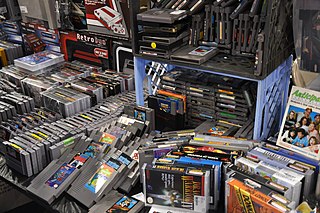
Adobe Flash is a multimedia software platform used for production of animations, rich internet applications, desktop applications, mobile apps, mobile games, and embedded web browser video players.

The Internet Archive is an American digital library founded on May 10, 1996, and chaired by free information advocate Brewster Kahle. It provides free access to collections of digitized materials including websites, software applications, music, audiovisual and print materials. The Archive is also an activist organization, advocating a free and open Internet. As of January 1, 2023, the Internet Archive holds more than 39 million print materials, 11.6 million pieces of audiovisual content, 2.6 million software programs, 15 million audio files, 4.7 million images, 251,000 concerts, and over 832 billion web pages in its Wayback Machine. Their mission is to provide "universal access to all knowledge."

A browser game is a video game that is played via the internet using a web browser. They are mostly free-to-play and can be single-player or multiplayer. Alternative names for the browser game genre reference their software platform used, with common examples being Flash games, and HTML5 games.
Newgrounds is a company and entertainment website founded by Tom Fulp in 1995. It hosts user-generated content such as games, films, audio, and artwork. Fulp produces in-house content at the headquarters and offices in Glenside, Pennsylvania.
SWF is an Adobe Flash file format used for multimedia, vector graphics and ActionScript. Originating with FutureWave Software, then transferred to Macromedia, and then coming under the control of Adobe, SWF files can contain animations or applets of varying degrees of interactivity and function. They may also occur in programs, commonly browser games, using ActionScript.

Digital obsolescence is the risk of data loss because of inabilities to access digital assets, due to the hardware or software required for information retrieval being repeatedly replaced by newer devices and systems, resulting in increasingly incompatible formats. While the threat of an eventual "digital dark age" was initially met with little concern until the 1990s, modern digital preservation efforts in the information and archival fields have implemented protocols and strategies such as data migration and technical audits, while the salvage and emulation of antiquated hardware and software address digital obsolescence to limit the potential damage to long-term information access.

A stick figure, or stick man, is a very simple drawing of a man or a woman composed of a few lines and a circle. Often drawn by children, stick figures are known for their simplistic style. The head is most often represented by a circle, which can be a solid color or embellished with details such as eyes, a mouth, or hair. The arms, legs, torso, and abdomen are usually represented with straight lines. Details such as hands, feet, and a neck may be present or absent; simpler stick figures often display an ambiguous emotional expression or disproportionate limbs.
Netscape Plugin Application Programming Interface (NPAPI) was an application programming interface (API) of the web browsers that allows plugins to be integrated.
Adobe Flash Player is computer software for viewing multimedia contents, executing rich Internet applications, and streaming audio and video content created on the Adobe Flash platform. It can run from a web browser as a browser plug-in or independently on supported devices. Originally created by FutureWave under the name FutureSplash Player, it was renamed to Macromedia Flash Player after Macromedia acquired FutureWave in 1996. It was then developed and distributed by Adobe Systems as Flash Player after Adobe acquired Macromedia in 2005. It is currently developed and distributed by Zhongcheng for users in China, and by Harman International for enterprise users outside of China, in collaboration with Adobe.
Flashpoint or flash point may refer to:

Unity is a cross-platform game engine developed by Unity Technologies, first announced and released in June 2005 at Apple Worldwide Developers Conference as a Mac OS X game engine. The engine has since been gradually extended to support a variety of desktop, mobile, console and virtual reality platforms. It is particularly popular for iOS and Android mobile game development, is considered easy to use for beginner developers, and is popular for indie game development.

Microsoft Silverlight is a discontinued application framework designed for writing and running rich internet applications, similar to Adobe's runtime, Adobe Flash. A plugin for Silverlight is still available for a very small number of browsers. While early versions of Silverlight focused on streaming media, later versions supported multimedia, graphics, and animation, and gave support to developers for CLI languages and development tools. Silverlight was one of the two application development platforms for Windows Phone, but web pages using Silverlight did not run on the Windows Phone or Windows Mobile versions of Internet Explorer, as there was no Silverlight plugin for Internet Explorer on those platforms.

Google Chrome is a cross-platform web browser developed by Google. It was first released in 2008 for Microsoft Windows, built with free software components from Apple WebKit and Mozilla Firefox. Versions were later released for Linux, macOS, iOS, and also for Android, where it is the default browser. The browser is also the main component of ChromeOS, where it serves as the platform for web applications.
Google Native Client (NaCl) is a discontinued sandboxing technology for running either a subset of Intel x86, ARM, or MIPS native code, or a portable executable, in a sandbox. It allows safely running native code from a web browser, independent of the user operating system, allowing web apps to run at near-native speeds, which aligns with Google's plans for ChromeOS. It may also be used for securing browser plugins, and parts of other applications or full applications such as ZeroVM.

Adobe Animate is a multimedia authoring and computer animation program developed by Adobe Inc.
Modern HTML5 has feature-parity with the now-obsolete Adobe Flash. Both include features for playing audio and video within web pages. Flash was specifically built to integrate vector graphics and light games in a web page, features that HTML5 also supports.

The Flash is a 2023 American superhero film based on the DC Comics character of the same name. Produced by Warner Bros. Pictures, DC Studios, Double Dream, and the Disco Factory, and distributed by Warner Bros. Pictures, it is the 13th installment in the DC Extended Universe (DCEU). The film was directed by Andy Muschietti from a screenplay by Christina Hodson, based on a story by Joby Harold and the writing team of John Francis Daley and Jonathan Goldstein. It stars Ezra Miller as Barry Allen / The Flash alongside Sasha Calle, Michael Shannon, Ron Livingston, Maribel Verdú, Kiersey Clemons, Antje Traue, and Michael Keaton. In the film, Barry travels back in time to prevent his mother's death, which brings unintended consequences.
Open Mainframe Project is a Collaborative Project managed by the Linux Foundation to encourage the use of Linux-based operating systems and open source software on mainframe computers. The project was announced on August 17, 2015 and was driven by IBM, a major supplier of mainframe hardware, as well as 16 other founding members, that included SUSE, CA Technologies, BMC Software, Compuware as well as clients and partners such as RSM Partner, Vicom Infinity, L3C LLP and ADP, and academic institutions such as Marist College and University of Bedfordshire. Coincident with the announcement, IBM also announced a partnership with Canonical to make the Ubuntu operating system available for their high-end z Systems hardware.

Video game preservation is a form of preservation applied to the video game industry that includes, but is not limited to, digital preservation. Such preservation efforts include archiving development source code and art assets, digital copies of video games, emulation of video game hardware, maintenance and preservation of specialized video game hardware such as arcade games and video game consoles, and digitization of print video game magazines and books prior to the Digital Revolution.

Ruffle is an emulator for SWF files. Ruffle is freely licensed and developed openly on GitHub.









